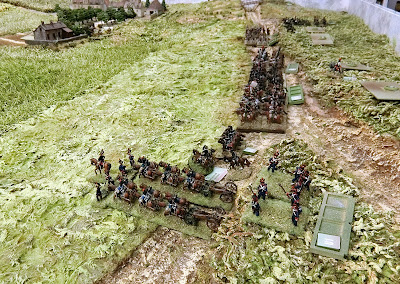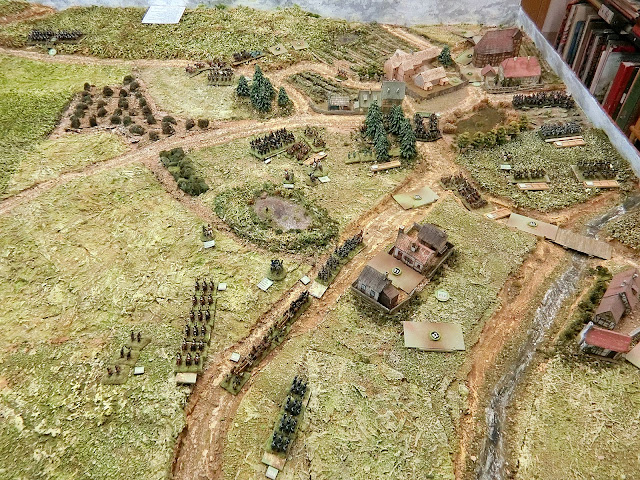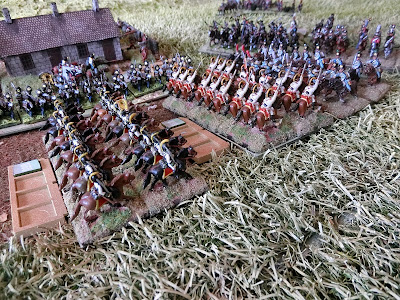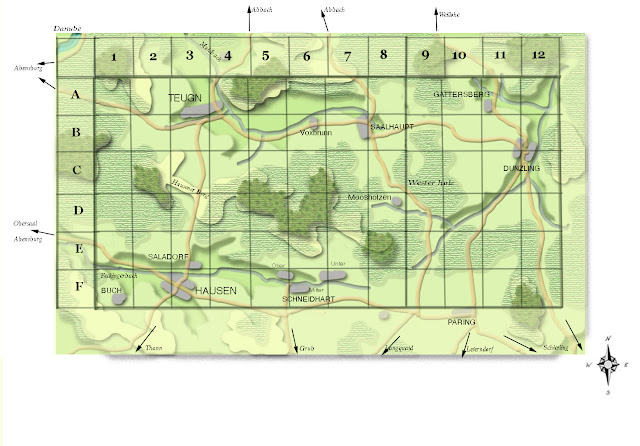Sincere apologies to those who follow me for active wargaming content. To be honest it has been a very productive and creative year artistically (model buildings and terrain, 2D paintings and painting several hundred 15/18mm figures) but not many actual games. However a lot of that effort has been spent in writing a "new" set of rules for large regiment/brigade level games, and this post will show you the first experimental "big game" with them.
Some may recall I wrote an intro to my ideas and showed the armies at the end of my wrap-up blog post from 2022. Please have a look if you need a reminder. 1809 Armies at New Year 2023
I'm pleased to say all the aims I wrote in that have been achieved and we are pressing on to success.
The Battle of Emmerting-Burghausen - test game
I was keen to try a big battle on the 12 x 6 foot table while I still had it intact from those games in 2022 (remember the Winter Jacobite game of Althorp?). So I restored it to a green/brown terrain meant to be Bavaria in a wet April of 1809. I added in my newly acquired 3D-printed German buildings and spruce trees, then concocted a fictitious battle and a campaign background to give it some context. Here are the briefing documents and orbats for anyone interested Emmerting-Burghausen documents. The idea was to have a large French and allied Corps army pressing an even larger and still viable part of the Austrian army which had the incentive to retreat, after a set number of moves, by roads to the rear and Eastern corner. The French force had more effective leaders (Paul B. was Marshal Lannes) and therefore the ability to move faster, so might interfere with that plan.
I won't give a link to the rules at this stage as they did not entirely work (that's why we test!), and we only got four, fairly eventful, moves done. No point dwelling on it in too much detail so I'll present a lot of photos and hope you enjoy them, and then I will wrap up at the end and say what we did next.
 |
| Table before the troops. |
 |
| An overall view at deployment time. The blank green bases are blinds which may or may not conceal real units. Next few photos are a tour of the armies on at the start |
 |
| 3D printed buildings which were the subject of a post earlier this year |
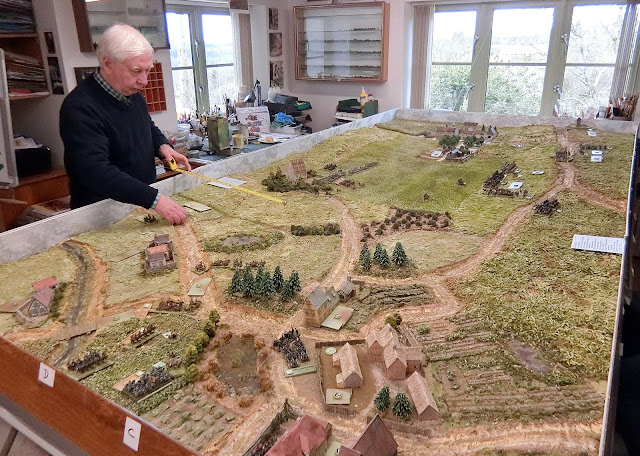 |
| Both sides were due to get reinforcements to their front lines very early on. Richard is bringing up light troops at speed |
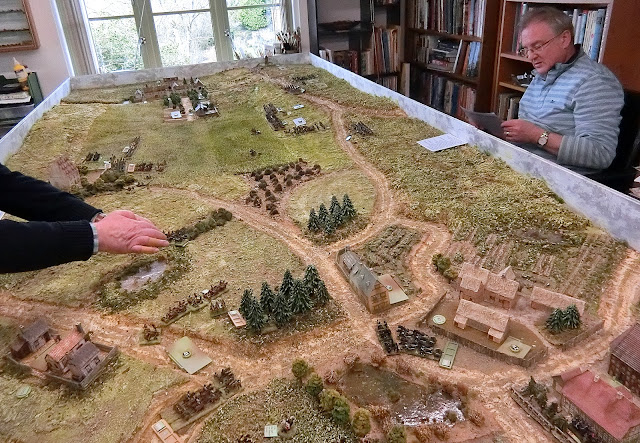 |
| Paul will be bringing his on shortly on his left flank |
 |
| Nearest villages are mostly downloadable card ones which followers will have seen on my18th century tables |
 |
| Up to this game (March 2023) the vast majority of the troops were bought on Ebay and painted by others. They are nice but I can't take any credit. More of mine in future games. |
 |
| In the distance Paul has advanced quickly with Montbrun's Cavalry Division, hoping to exploit the unoccupied enemy central area |
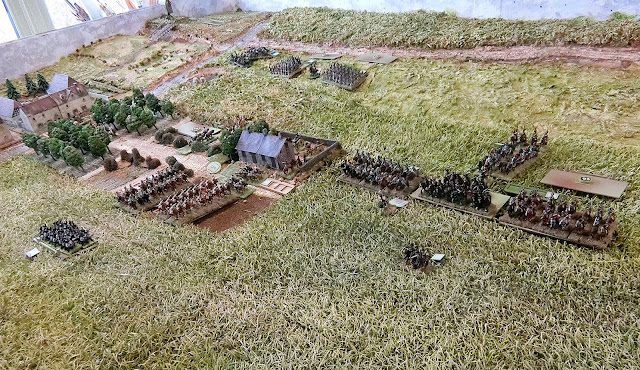 |
| To Montbrun's dismay Lannes' scout squadron has revealed a Brigade of Austrian Cuirassiers lurking behind the hamlet and gardens of Gendorf |
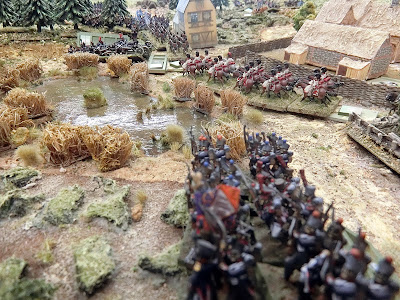 |
| Bavarian Dragoons and infantry advance through Burghausen |
 |
| Bavarian artillery |
 |
| Austrian Grenadiers in Gendorf will soon want to form squares |
 |
| Bavarian and Austrian light cavalry brigades clash |
 |
| And battle is also joined between the larger formations to the West. French Hussars backed up by Chasseurs |
 |
| Richard has to pull back his Lancers |
 |
| A regiment of Archduke Charles Legion attacks the Bavarian infantry supported by two artillery batteries |
 |
| The successful Cuirassiers look menacing |
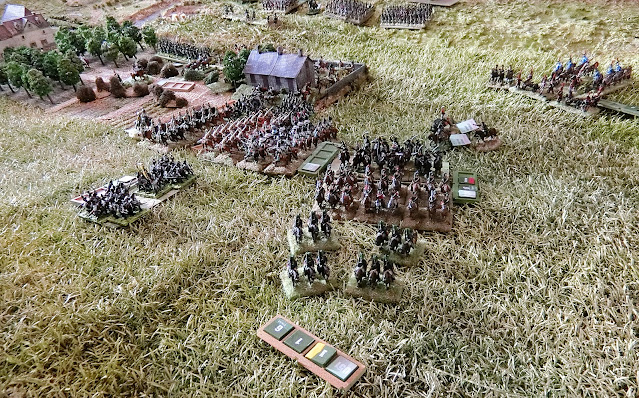 |
| More Austrian Grenadiers in squares while the cavalry fight - Chasseurs have broken an Austrian Hussar regiment |
 |
| Although the front Austrian Cuirassiers have been broken collective losses have caused all Montbrun's cavalry to withdraw to reform |
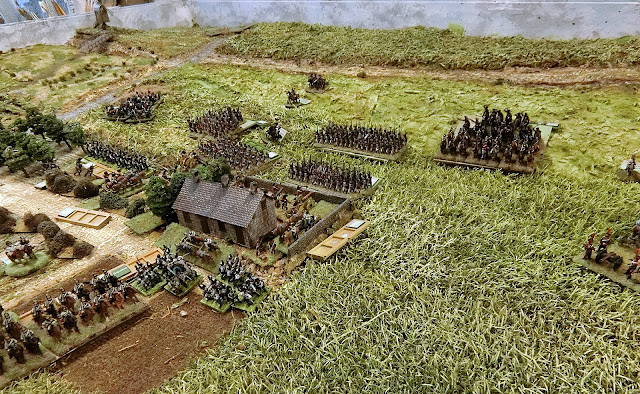 |
| French infantry at last attack Gendorf and the nearby orchards and kitchen gardens |
 |
| French turn to form squares to defend the gap in front of the Burghausen rathaus and church |
 |
| Austrian lancers reform while eyeing up the Cuirassier threat |
 |
| One Austrian battery is broken by Bavarian cavalry....... |
 |
| .......who go on to hit Archduke Charles Legion in the flank, forcing them to flee through the pond |
Conclusion
In only Four Moves there was, not surprisingly, no result of who might win, but it was only a test game so the main lessons were:
- The Hit Table needed to be more drastic, especially for Artillery and for Open Order troops.
- Units were "Done For" quicker than I wanted so that was still too predictable.
- Leaders did not have as much effect as I hoped, except on Movement.
- Squares need a better boost (we did not in fact test them but I had forgotten to give them an advantage - shades of HoW 18th century not yet shaken from my brain!)
- With the rules as they were this was too big a game to be played by only two players in one day to a conclusion. There were about 1300 figures in play, so representing about 65, 000.
- My new ideas on Leadership Ratings/Initiative and increased Movement rates had worked very well in my opinion.
Paul and Richard expressed some satisfaction with the game, and were both extremely helpful in guiding suggested amendments. They amounted to quite a lot but I felt the rules were now shaping up for something smoother.
In the next post I will describe how I was able to move on to my first refight of an actual 1809 battle. I'm trying to take them roughly in chronological order so this would be Landshut/Altdorf. It was only a large Divisional engagement, albeit with some peculiarities which I felt would engage the ingenuity of the players and test most of the rules I needed to judge. The good thing was that it should enable a decent amount of Moves and to see how the different results of the Hit Table reactions and reforming rules would feel.
>>>>>>>>>>>>>>>>>>>>>>>>>>>>>>>>>>>>>>>>>>>>>>>>>>>>>>>>>>>>>>>>>>>>>>>>
AN INVITATION
I hope you enjoyed, at least the spectacle of this game, I certainly did.
Landshut/Altdorf was a success, as you will read in due course, and little or no changes were needed from that game, so I am currently planning the next historic refight. This will be the sprawling actions around Hausen, Teugn and Dunzling on 19th April 1809 with a few what-ifs thrown in to to spice it up. It will be a "big game" similar in size to the one in this post but with historical orders of battle and objectives and taking place over two days - 29th-30th July 2023.
I sent invitations to a lot of friends but it appears it is "that time of year" when so many are already booked with holidays or family commitments. Only a few can make it - enough to play but there is still room to make a proper multi-player game of it.
If any of my followers have got this far and want to help me test Stage Three of the development of "Abensburg to Wagram", and can get to my place between Stroud and Cirencester in The Cotswolds of Gloucestershire for one or both days, please don't be shy and email me for more info - Chris Gregg
Gratuitous plug - here is the map I have just made to design the table for Hausen-Teugn-Dunzling
>>>>>>>>>>>>>>>>>>>>>>>>>>>>>>>>>>>>>>>>>>>>>>>>>>>>>>>>>>>>>>>>>>>>>>>




